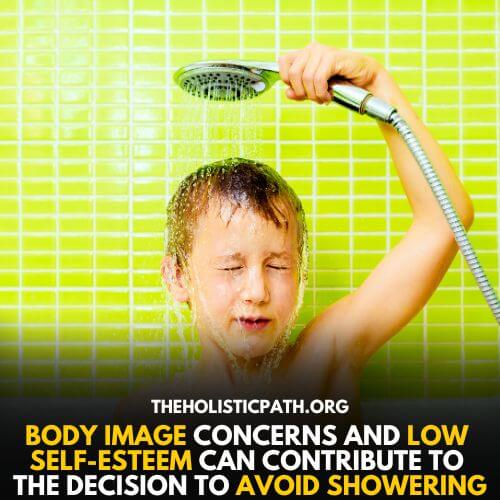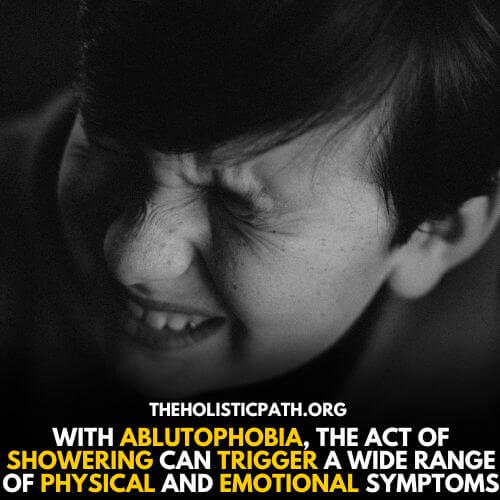Personal hygiene is a fundamental aspect of daily life that significantly influences both physical health and social interactions. While regular showering is widely accepted as a basic practice, there exists a subset of individuals who struggle with consistent adherence to this routine.
Delving beyond the surface, it becomes evident that the decision to forgo frequent showers can be attributed to a range of psychological factors that intertwine with one’s mental and emotional state. This article delves into the intriguing realm of “Psychological Reasons for Not Showering,” shedding light on the intricate interplay of emotions, perceptions, and habits that underlie this seemingly mundane aspect of self-care. By understanding the deeper motivations behind such behavior, we can gain valuable insights into the human psyche and foster empathy for those grappling with these challenges.
5 Top Psychological Reasons for Not Showering
While showering is a commonplace practice for maintaining personal hygiene, the decision to neglect or avoid it can be rooted in a complex web of psychological factors. Understanding these reasons goes beyond mere surface-level analysis, offering insights into individuals’ emotions, perceptions, and mental states. Here are some of the reasons why some people may avoid shower:
1. Depression and Low Mood
Depression, a prevalent mental health condition, can significantly impact a person’s motivation and ability to engage in daily activities, including personal hygiene routines like showering. The overwhelming sense of sadness, lack of energy, and feelings of hopelessness associated with depression often lead to neglecting self-care practices. Tasks as simple as taking a shower can feel daunting and exhausting, contributing to a cycle of neglect that further exacerbates feelings of low self-worth.
Individuals experiencing depression may struggle with the basic motivation to perform hygiene tasks due to the cognitive and emotional burdens they carry. Feelings of indifference towards their appearance, coupled with a pervasive sense of fatigue, can hinder the perceived benefits of showering. Additionally, the sense of accomplishment that usually accompanies completing tasks can be elusive for someone grappling with depression, making it difficult to establish a consistent showering routine.
2. Social Anxiety and Isolation
Social anxiety, characterized by an intense fear of judgment and scrutiny in social situations, can play a significant role in a person’s reluctance to shower. For individuals with social anxiety, the thought of exposing their bodies, even in the private setting of a shower, can trigger feelings of extreme self-consciousness and discomfort. The fear of being perceived negatively by others, even if those others are imagined as internal critics, can deter them from engaging in self-care activities that involve personal exposure.
Moreover, the anticipation of encountering people, whether it’s in shared living spaces or public places like gyms or communal bathrooms, can intensify the anxiety around showering. The prospect of potential interactions, no matter how brief or casual, can lead to avoidance behaviors, further reinforcing the cycle of isolation and hygiene neglect.
3. Perfectionism and Unrealistic Standards
Perfectionism, while often seen as a desirable trait, can manifest in harmful ways, impacting various aspects of an individual’s life, including personal hygiene routines. Those with perfectionistic tendencies may set unattainably high standards for themselves in all domains, including appearance and self-care. This can create a paralyzing fear of failure, where the individual believes that if they can’t meet their standards perfectly, they shouldn’t engage in the activity at all.
In the context of showering, a perfectionist may avoid the task altogether if they don’t have the time or energy to perform it exactly as they believe it should be done. This can lead to procrastination and an unhealthy all-or-nothing mindset, where a missed shower becomes a significant source of self-criticism and distress.
The fear of not living up to their own ideals can create a perpetual cycle of avoidance and heightened stress.

4. Body Image and Self-Esteem
Body image concerns and low self-esteem can contribute to the decision to avoid showering. Negative perceptions of one’s body can lead to discomfort with being unclothed, even in the privacy of a shower. Those struggling with body image may experience heightened shame and self-disgust, which can intensify during hygiene routines that necessitate self-exposure.
Furthermore, past experiences of body shaming, bullying, or trauma can deeply influence a person’s attitude toward their body and hygiene.
The act of showering may inadvertently trigger distressing memories or feelings, making it a psychologically taxing task. Overcoming these barriers often requires not only addressing the negative self-perceptions but also building a sense of self-acceptance and compassion.
5. Executive Dysfunction and Mental Health
Executive dysfunction, a common feature of various mental health conditions such as ADHD, can hinder an individual’s ability to initiate and complete tasks, including showering. This dysfunction can manifest as difficulties in planning, organizing, and executing activities. For someone with executive dysfunction, the sequential nature of showering, involving steps like gathering supplies, adjusting water temperature, and maintaining focus, can be overwhelming and challenging to navigate.
Furthermore, the sensory experiences associated with showering, like water pressure, temperature changes, and tactile sensations, can be either overstimulating or distracting for individuals with certain mental health conditions. These challenges can lead to procrastination, avoidance, and a disrupted routine, ultimately affecting personal hygiene.
Ablutophobia: Understanding the Fear of Showering
Ablutophobia, also known as Shower Avoidance Syndrome, is a specific phobia characterized by an intense and irrational fear of bathing, cleaning, or washing oneself. Individuals with ablutophobia experience extreme anxiety and distress at the mere thought of taking a shower or engaging in any form of personal hygiene that involves water. This fear often goes beyond mere discomfort; it can lead to avoidance behaviors and a significant impact on an individual’s daily life.
Ablutophobia in most cases stems from:
- Early Traumatic Experiences: Ablutophobia often has its roots in early traumatic experiences related to water, bathing, or hygiene practices. These experiences can range from accidents or near-drowning incidents to uncomfortable or distressing encounters during childhood.
- Associations with Anxiety Disorders: In some cases, ablutophobia might arise as a manifestation of an underlying anxiety disorder. The fear of showering can be amplified by general feelings of apprehension and panic experienced by individuals with anxiety disorders.
- Heightened Vulnerability: Individuals who have experienced past incidents of bullying, harassment, or ridicule related to their personal hygiene may develop ablutophobia as a defense mechanism. The fear of being vulnerable in the context of bathing can stem from these past negative experiences.
For those with ablutophobia, the act of showering can trigger a wide range of physical and emotional symptoms, including rapid heartbeat, shortness of breath, nausea, sweating, and even panic attacks. The origins of ablutophobia can vary, with some cases stemming from traumatic experiences related to water or bathing during childhood. For others, the fear might be tied to underlying anxiety disorders or past incidents that have led to a heightened sense of vulnerability.
The complex interplay between ablutophobia and the psychological reasons mentioned earlier is notable.
For example, individuals with depression may find the fear of showering compounded by their low mood, making the task seem insurmountable. Similarly, those with anxiety disorders might find their fears amplified in the confined space of a shower.
Recognizing ablutophobia as a distinct psychological condition highlights the multifaceted nature of personal hygiene habits. While the reasons for not showering can be rooted in various psychological factors, ablutophobia showcases how a specific fear can have far-reaching consequences.
Approaches to addressing ablutophobia often involve cognitive-behavioral therapy, exposure therapy, and a supportive environment that encourages gradual desensitization to the triggering stimulus. Understanding ablutophobia within the broader context of psychological factors influencing personal hygiene can pave the way for effective interventions and greater empathy for individuals navigating these challenges.

How Do I Motivate Myself to Take a Shower? 12 Best Tips
Motivating yourself to take a shower might seem like a simple task for most people, but for individuals facing psychological barriers or low motivation, it can be challenging. However, there are several strategies you can employ to help you overcome these hurdles and build a consistent showering routine. Here’s a detailed guide on how to motivate yourself to take a shower:
- Set Realistic Goals: Start small by setting achievable goals. Rather than aiming to take long, elaborate showers right away, set a goal to step into the shower for a few minutes. Gradually increase the time spent in the shower as you become more comfortable. Achieving these mini-goals can provide a sense of accomplishment and motivate you to continue.
- Create a Routine: Establishing a consistent routine can make showering feel more automatic and less daunting. Choose a specific time of day for your showers, such as in the morning to wake up or in the evening to relax. The predictability of a routine can help eliminate the need to make decisions, making it easier to initiate the activity.
- Break it Down: If the idea of taking a full shower feels overwhelming, break down the process into smaller steps. Start by turning on the water, then gradually progress to undressing, stepping into the shower, and so on. By tackling one step at a time, the overall task becomes more manageable.
- Use Positive Reinforcement: Reward yourself after completing a shower. This positive reinforcement can be as simple as treating yourself to a favorite snack, watching an episode of a show you enjoy, or listening to music you love. Over time, your brain will associate showering with positive experiences.
- Practice Mindfulness: Before stepping into the shower, practice mindfulness techniques. Take a few deep breaths and focus on the present moment. Engage your senses by paying attention to the sound of the water, the sensation of the water on your skin, and the smell of your soap. Mindfulness can help reduce anxiety and make the experience more enjoyable.
- Create a Relaxing Atmosphere: Enhance your showering environment to make it more inviting. Use scented soaps or essential oils, play calming music, or dim the lights to create a spa-like atmosphere. This can transform showering from a chore into a soothing self-care activity.
- Visualize the Outcome: Imagine how you’ll feel after taking a shower – refreshed, clean, and invigorated. Visualizing the positive outcome can help override any negative feelings or resistance you may have. Focus on the sense of accomplishment and well-being you’ll experience once you’re done.
- Get an Accountability Partner: Share your goal of showering regularly with a friend, family member, or roommate who can provide support and encouragement. Knowing that someone is cheering you on can boost your motivation and make the process more enjoyable.
- Incorporate Showering into a Routine Activity: Link showering with another activity you enjoy. For instance, you could listen to a podcast or your favorite album while showering. This creates an association between the pleasurable activity and showering, making it more appealing.
- Embrace Self-Compassion: If you’re struggling with showering due to negative self-talk or body image concerns, practice self-compassion. Be kind to yourself and remind yourself that everyone has moments of struggle. Treat yourself with the same care and understanding you would offer a friend facing similar challenges.
- Track Your Progress: Keep a journal or use a habit-tracking app to record your showering efforts. Seeing your progress over time can be motivating and provide a sense of accomplishment. Celebrate even the small victories as they contribute to your overall goal.
- Seek Professional Help if Needed: If your lack of motivation to shower is tied to deeper psychological issues such as depression, anxiety, or body image concerns, consider seeking help from a mental health professional. Therapy can provide you with effective coping strategies tailored to your individual situation.
Remember that change takes time, and it’s okay to take things one step at a time. Be patient with yourself and celebrate every effort you make towards maintaining a healthy self-care routine.
8 Helpful Ways for Dealing with Psychological Reasons for Not Showering
Dealing with the psychological reasons behind not showering is essential for maintaining physical health and overall well-being. Aversion to showering can stem from various psychological factors such as anxiety, depression, sensory sensitivities, and body image issues. Addressing these underlying causes requires a multifaceted approach that combines understanding, support, and therapeutic techniques.
1. Cognitive-Behavioral Therapy (CBT)
Cognitive-behavioral therapy (CBT) is a well-established psychological approach that can be highly effective in addressing the root causes of not showering. A trained therapist works with the individual to identify negative thought patterns, beliefs, and behaviors that contribute to the aversion to showering. These might include distorted body image perceptions, fears of contamination, or overwhelming anxiety associated with the act of showering.
During CBT sessions, individuals learn to challenge and reframe these negative thoughts through evidence-based techniques. They acquire skills to manage anxiety and develop a more realistic perspective on showering. Gradual exposure exercises are often a core component of CBT, where individuals are guided through incrementally more challenging steps related to showering, helping them desensitize their fears over time.
2. Mindfulness and Relaxation Techniques
For individuals who experience heightened stress, sensory sensitivities, or overwhelming emotions linked to showering, incorporating mindfulness and relaxation techniques into their routine can be beneficial. Practices such as deep breathing, meditation, and progressive muscle relaxation can help individuals manage stress and sensory issues before and during showering.
These techniques promote a state of relaxation, making the showering experience more tolerable and less anxiety-inducing.
Mindfulness practices also encourage individuals to be present at the moment and focus on their senses, allowing them to detach from any negative thoughts or anxieties that might arise while showering.
3. Systematic Desensitization
Systematic desensitization is a gradual and structured approach often used to treat phobias and anxieties. The goal is to break down the overwhelming fear associated with showering into smaller, manageable steps. With the guidance of a therapist, individuals begin by engaging in activities that only mildly trigger their anxiety, gradually progressing to more anxiety-provoking tasks related to showering.
For example, the process might start with simply entering the bathroom without turning on the water. Over time, these small steps build confidence and decrease the overall fear response, making the idea of showering less daunting.
4. Reward-Based Behavior Modification
Reward-based behavior modification leverages the power of positive reinforcement to motivate individuals to engage in showering. This approach is particularly effective for those who struggle with depressive symptoms or a lack of interest in self-care activities. Setting up a structured reward system where completing the showering routine leads to a small, enjoyable reward can help shift the individual’s perspective and create positive associations with showering.
Rewards can be simple, such as enjoying a favorite snack, engaging in a leisure activity, or treating oneself to a relaxing evening. Over time, the intrinsic motivation to shower can increase as the individual begins to associate showering with positive experiences.
5. Virtual Reality Exposure Therapy (VRET)
Virtual Reality Exposure Therapy (VRET) is a modern technique that utilizes virtual reality technology to create controlled environments where individuals can confront their fears or anxieties. In the context of not showering, VRET can simulate the showering process within a virtual setting.
This approach is particularly helpful for individuals with severe aversions to showering who might find it challenging to face their fear directly.
Through VRET, individuals can gradually expose themselves to virtual showers, enabling them to practice managing their anxiety responses in a safe and controlled environment. Over time, this exposure can help reduce avoidance behaviors and desensitize the individual to the actual experience of showering.

6. Support Groups and Peer Engagement
Joining support groups or engaging with peers who have similar struggles can provide a valuable sense of community and understanding. Connecting with others who share similar experiences can reduce feelings of isolation and stigma. In these settings, individuals can openly share their challenges, strategies, and successes, gaining insights and encouragement from those who have overcome similar obstacles.
Support groups can be in-person or online, offering a platform for individuals to exchange coping techniques and learn from each other’s journeys towards better self-care.
7. Professional Consultation for Underlying Mental Health Issues
In cases where the aversion to showering is deeply intertwined with underlying mental health conditions such as depression, anxiety disorders, obsessive-compulsive disorder (OCD), or body dysmorphic disorder, seeking professional consultation is crucial. Licensed therapists or psychologists can conduct comprehensive assessments to diagnose these conditions accurately.
Once diagnosed, individuals can receive targeted therapy and, if necessary, medication to address the root causes of their psychological barriers. Treating these underlying issues can significantly improve an individual’s capacity to engage in regular self-care activities like showering.
8. Personalized Self-Care Plan
Collaborating with a mental health professional to create a personalized self-care plan tailored to the individual’s needs and preferences can be transformative. This plan goes beyond addressing showering alone and encompasses a holistic approach to self-care.
The plan may include setting achievable showering goals, integrating grooming routines with other enjoyable activities, gradually expanding the self-care regimen, and incorporating strategies learned from therapy. A personalized approach increases the likelihood of success, as it aligns with the individual’s unique circumstances and motivations.
Conclusion
The reluctance to shower, driven by psychological factors, highlights the intricate interplay between our mental and physical well-being. From anxiety and depression to sensory sensitivities and body image concerns, these underlying issues can cast a shadow over what is typically seen as a routine activity.
Recognizing that these reasons are valid and seeking appropriate support is crucial. By adopting strategies like cognitive-behavioral therapy, mindfulness techniques, and gradual exposure, individuals can gradually regain control over their self-care routines. Embracing empathy, patience, and professional guidance, we can create a path towards a healthier relationship with personal hygiene, fostering a positive impact on overall mental health and quality of life.
